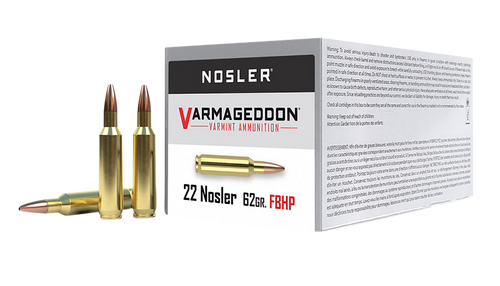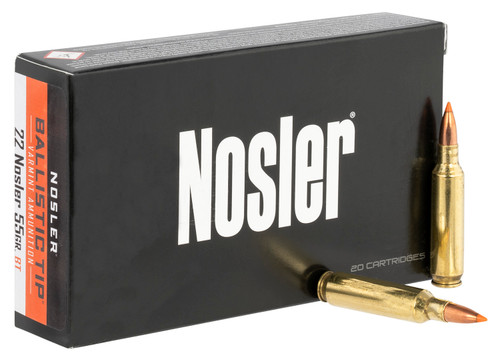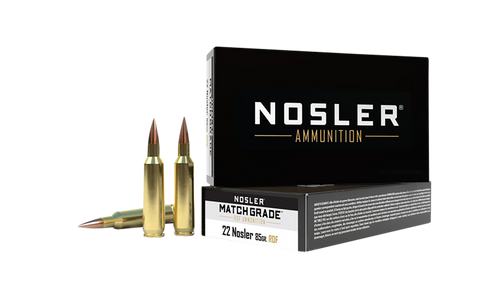.22 Nosler Ammo
22 Nosler: At a Glance
| Key Characteristics | |
|---|---|
| Firearm Type | Rifle |
| Primer Type | Large Rifle |
| Used For | Hunting, Long-range shooting |
| Case Design | Rimless, Bottleneck |
| Year Introduced | 2017 |
22 Nosler: Pros and Cons
Pros
- ✔ Higher velocity than .223 Rem/5.56 NATO
- ✔ Flatter trajectory for improved long-range performance
- ✔ Easy conversion for existing AR-15 platforms
- ✔ Versatile for varmint hunting and target shooting
- ✔ Improved terminal performance over .223 Rem
Cons
- ✘ Limited ammunition availability compared to more established cartridges
- ✘ Higher cost of ammunition
- ✘ Increased barrel wear due to higher velocities
- ✘ Not as widely accepted in competitive shooting as some other cartridges
- ✘ Requires specific magazines for optimal feeding
22 Nosler Ammo: In Depth
The 22 Nosler is a relatively new player in the world of rifle cartridges, but it has quickly gained a reputation as a high-performance option for shooters seeking enhanced ballistics in a familiar platform. This caliber offers a compelling blend of velocity, accuracy, and versatility, making it popular among hunters, competitive shooters, and firearms enthusiasts alike. Designed to maximize the potential of the .22 caliber bullet, the 22 Nosler pushes the boundaries of what's possible in the AR-15 platform and other modern sporting rifles.
History and Development
The 22 Nosler was introduced in 2017 by Nosler, Inc., a renowned ammunition and firearms manufacturer based in Bend, Oregon. The company, founded by John Nosler in 1948, has a long history of innovation in the shooting industry, particularly in bullet design and cartridge development.
The development of the 22 Nosler was driven by the desire to create a cartridge that could significantly outperform the popular .223 Remington/5.56 NATO while still being compatible with the AR-15 platform. Nosler's engineers set out to design a cartridge that would offer increased velocity, flatter trajectory, and greater energy delivery downrange without the need for extensive firearm modifications.
The result was a rebated rim design that allowed the 22 Nosler to function in standard AR-15 bolt carriers with only a barrel change. This innovative approach meant that shooters could easily upgrade their existing AR-15 rifles to the new caliber without investing in an entirely new firearm.
Since its introduction, the 22 Nosler has gained traction in various shooting disciplines. It has found particular favor among varmint hunters and long-range target shooters who appreciate its high velocity and flat trajectory. The caliber has also seen adoption in tactical and competitive shooting circles, where its performance advantages can translate into improved scores and greater effectiveness at extended ranges.
Complete Timeline of .22 Nosler Development:
.22 Nosler Performance
The 22 Nosler offers impressive ballistic performance that sets it apart from many other .22 caliber options. Here's a breakdown of its key performance characteristics:
| Characteristic | Performance |
|---|---|
| ► Velocity | 3,300-3,500 fps (55-grain bullets) ~3,000 fps (70-grain bullets) Surpasses .223 Remington by 300+ fps |
| → Trajectory | Remarkably flat Less bullet drop at extended ranges |
| ⚡ Energy | 500+ ft-lbs at 300 yards (55-grain bullet) vs. ~400 ft-lbs for .223 Remington |
| ↕ Recoil | Slightly more than .223 Remington Allows quick follow-up shots |
| ⦿ Accuracy | Sub-MOA groups at 100+ yards High ballistic coefficient & retained velocity |
22 Nosler: Bullet Weight vs. Muzzle Velocity
This chart shows how bullet weight affects muzzle velocity for the 22 Nosler cartridge.
Note: Actual velocities may vary based on specific loads, barrel length, and other factors. These values are estimates for comparison purposes.
22 Nosler: Effective Range for Different Game
This table provides estimated effective ranges for the 22 Nosler cartridge when hunting various game animals. Ranges are based on typical bullet weights and velocities.
| Game Type | Effective Range (yards) | Notes |
|---|---|---|
| Varmints (Prairie Dogs, Ground Squirrels) | 0-400 | Excellent for long-range varmint hunting |
| Small Predators (Coyotes, Foxes) | 0-300 | Good balance of velocity and energy for medium-sized predators |
| Small Game (Rabbits, Hares) | 0-200 | Use lighter bullets to minimize meat damage |
| Medium Game (Deer, Antelope) | 0-250* | *Use heavier bullets (70gr+) and limit to ethical ranges |
| Target Shooting | 0-600+ | Excellent for long-range target practice and competition |
Note: Effective ranges can vary based on factors such as bullet selection, shooter skill, wind conditions, and individual animal size. Always prioritize ethical shot placement and adhere to local hunting regulations.
22 Nosler: Barrel Twist Rate Optimization
Optimal barrel twist rates vary depending on bullet weight. This guide helps you choose the right twist rate for your preferred 22 Nosler loads.
| Bullet Weight (gr) | Recommended Twist Rate | Visualization (barrel length for one full rotation) |
|---|---|---|
| 40-55 | 1:8" |
8"
|
| 60-69 | 1:8" or 1:7" |
8"
7"
|
| 70-77 | 1:7" |
7"
|
| 80+ | 1:7" or faster |
7"
6"
|
Understanding Twist Rates
A barrel's twist rate refers to the distance a bullet travels to complete one full rotation. For example, a 1:8" twist means the bullet makes one complete rotation every 8 inches of barrel length.
- Faster twist rates (e.g., 1:7") make the bullet rotate more quickly, stabilizing heavier and longer bullets.
- Slower twist rates (e.g., 1:8") rotate the bullet more slowly, which can work well with lighter bullets.
- Many 22 Nosler rifles come with a 1:8" twist rate, which is a good all-around choice for most bullet weights.
In the visualization, shorter bars represent faster twist rates, as the bullet completes one full rotation in a shorter distance.
Note: These are general guidelines. Factors like bullet length, muzzle velocity, and intended use can also influence optimal twist rate. Always consult your rifle and ammunition manufacturers for specific recommendations.
Applications for 22 Nosler
The 22 Nosler's versatile performance profile makes it suitable for a wide range of shooting applications:
Available Firearms
The 22 Nosler is available in various firearm platforms, each offering unique advantages. Here's why you might choose each platform:
AR-15 Platform Rifles
Why choose: The AR-15 platform is the 22 Nosler's native habitat, offering:
- Easy conversion from .223/5.56 (often just a barrel swap)
- Semi-automatic operation for quick follow-up shots
- Customizable with a wide range of aftermarket parts
- Familiar ergonomics for many shooters
- Ideal for varmint hunting and competitive shooting
Bolt-Action Rifles
Why choose: Bolt-action rifles chambered in 22 Nosler offer:
- Maximum accuracy potential for long-range shooting
- Robust action suitable for heavy use and harsh conditions
- Often lighter overall weight compared to AR-15s
- Preferred by many hunters for their simplicity and reliability
- Excellent for precision varmint hunting and target shooting
Semi-Auto Rifles (Non-AR-15)
Why choose: Other semi-automatic designs in 22 Nosler provide:
- Alternative ergonomics that some shooters may prefer
- Potentially better suited for left-handed shooters
- May offer proprietary features or benefits
- Could be legal in areas with restrictions on AR-15 style rifles
Custom Builds
Why choose: Custom-built 22 Nosler rifles allow for:
- Tailored specifications to meet specific shooting needs
- Integration of high-end or specialized components
- Unique designs not available in factory options
- Optimization for particular applications (e.g., long-range varmint hunting, competition)
Manufacturer Options
Here are some of the manufacturers offering 22 Nosler firearms in various platforms:
- AR-15 Platform: Nosler (M48 Independence AR), Noveske, CMMG, Wilson Combat
- Bolt-Action: Nosler (M48 Long Range Carbon), Savage, Mossberg
- Semi-Automatic (Non-AR-15): Limited options, but some manufacturers are exploring this platform
- Custom Builders: Many custom rifle builders offer 22 Nosler as an option across various platforms
Available Ammunition
The 22 Nosler is supported by a growing selection of factory ammunition, as well as components for handloaders.
| Manufacturer | Popular Loads | Velocity |
|---|---|---|
| Nosler | 55-grain Ballistic Tip Varmint | 3350 fps |
| Nosler | 70-grain RDF Match | 3000 fps |
| Nosler | 77-grain Custom Competition | 2950 fps |
| Federal Premium | 55-grain Nosler Ballistic Tip | 3300 fps |
| Black Hills | 77-grain Sierra MatchKing | 2900 fps |
Caliber Comparisons
To understand the 22 Nosler's place in the shooting world, it's helpful to compare it to similar cartridges. Click on each comparison to see more details:
Recoil Energy Comparison
Compare the estimated recoil energy of the 22 Nosler with other popular cartridges. (Based on a 7.5 lb rifle)
Note: Recoil energy can vary based on specific loads, rifle weight, and other factors. These values are estimates for comparison purposes.
Ballistic Trajectory Comparison
This chart compares the ballistic trajectory (bullet drop) of the 22 Nosler with other popular cartridges over distance.
Note: Trajectories are calculated for a 100-yard zero. Actual results may vary based on specific loads, atmospheric conditions, and firearm characteristics.
Wind Drift Comparison
This chart compares the wind drift of the 22 Nosler with other popular cartridges in a 10 mph crosswind.
Note: Wind drift is calculated for a 10 mph full-value crosswind. Actual results may vary based on specific loads, atmospheric conditions, and firearm characteristics.
Energy Retention Comparison
This chart compares the energy retention of the 22 Nosler with other popular cartridges over distance.
Note: Energy values are calculated based on typical bullet weights and velocities for each cartridge. Actual results may vary based on specific loads and environmental conditions.
Estimated Barrel Life Expectancy Comparison
This chart provides a general comparison of estimated barrel life for the 22 Nosler and similar cartridges. Actual barrel life can vary significantly based on factors such as firing schedule, barrel quality, and maintenance.
| Cartridge | Estimated Barrel Life (Rounds) |
|---|---|
| 22 Nosler |
|
| .223 Remington |
|
| .224 Valkyrie |
|
| 6.5 Grendel |
|
| .22-250 Remington |
|
Note: These are rough estimates and can vary greatly depending on usage, load data, cleaning regimen, and individual barrel characteristics. High-volume shooters may see shorter lifespans, while casual shooters might experience longer barrel life.
Sectional Density Comparison
Sectional density is a measure of a bullet's mass relative to its diameter. Higher sectional density generally indicates better penetration and energy retention.
| Cartridge | Bullet Weight (gr) | Sectional Density | Relative SD |
|---|---|---|---|
| 22 Nosler | 55 | 0.157 |
|
| 22 Nosler | 77 | 0.220 |
|
| .223 Remington | 55 | 0.157 |
|
| .224 Valkyrie | 90 | 0.257 |
|
| 6.5 Grendel | 123 | 0.252 |
|
| .22-250 Remington | 55 | 0.157 |
|
Note: Sectional density is calculated as (bullet weight in pounds) / (bullet diameter in inches)². Higher sectional density generally indicates better penetration, but other factors like velocity and bullet construction also play significant roles in overall performance.
Conclusion
The 22 Nosler represents a significant advancement in .22 caliber cartridge design, offering enhanced performance in a package that's compatible with one of the most popular rifle platforms in the world. Its combination of high velocity, flat trajectory, and moderate recoil makes it an attractive option for a wide range of shooters.
Varmint hunters will appreciate its devastating effect on small game, while long-range enthusiasts will value its ability to reach out to extended distances with less compensation for bullet drop and wind drift. For AR-15 owners looking to upgrade their rifles' performance without investing in an entirely new platform, the 22 Nosler presents a compelling option.
While it may not have achieved the widespread adoption of some more established cartridges, the 22 Nosler has carved out a niche for itself among shooters who demand top-tier performance from their .22 caliber rifles. As more manufacturers continue to support the cartridge with firearms and ammunition options, its popularity is likely to grow.
.22 Nosler Ammunition FAQs:
Yes, in most cases. Conversion typically requires only a barrel change and possibly a new magazine, as the 22 Nosler uses the same bolt face as the .223 Remington/5.56 NATO.
The 22 Nosler produces slightly more recoil than the .223 Remington, but the difference is minimal and most shooters find it easily manageable.
While it can be effective for deer-sized game at moderate ranges with proper bullet selection, many hunters prefer larger calibers for better terminal performance and ethical kills.
The effective range depends on the specific load and intended target. For varmint hunting, it can be effective beyond 400 yards. For target shooting, skilled marksmen can engage targets at 600 yards or more.
Due to its high velocity, the 22 Nosler may experience faster barrel wear than the .223 Remington. However, with proper care and cleaning, barrels can still provide excellent service life.






